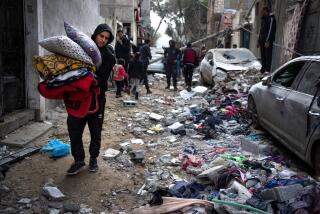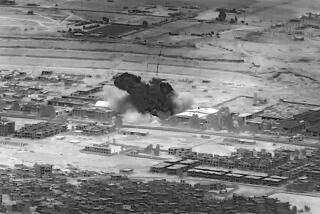They Act Like Guerrillas
Defense Secretary Donald H. Rumsfeld’s attempt to blame looters, criminals and Saddam Hussein loyalists -- rather than “guerrillas” -- for attacks in Iraq on U.S. soldiers just won’t wash. Instead, the killings of nearly two dozen U.S. troops since May 1, when President Bush declared major combat over, bear the marks of classic guerrilla operations: small-scale, limited attacks by irregulars against orthodox civil and military forces.
U.S. soldiers in the field -- confronting increasingly angry Iraqis and with casualties mounting -- don’t shy away from calling the killers guerrillas. Two Baghdad ambushes wounded six U.S. soldiers Tuesday. In Fallouja, a stronghold of pro-Hussein sentiment, an explosion in a mosque compound that killed 10 Iraqis was blamed on Americans, not on the more likely culprit: weapons or bombs stored there.
In February, weeks before combat began, Gen. Eric K. Shinseki, the Army chief of staff, told the Senate that postwar Iraqi peacekeeping and humanitarian operations probably would require about 200,000 troops. Rumsfeld disputed the figure, and his deputy, Paul D. Wolfowitz, called it “wildly inaccurate.” Today, the Pentagon has about 150,000 troops deployed in Iraq; Britain has about 12,000. Shinseki, who retired in June and was often at loggerheads with Rumsfeld, appears prescient.
That’s unsurprising given Shinseki’s earlier command of NATO’s Bosnian peacekeeping force. But will Bush administration officials, having snubbed Shinseki and others in the Pentagon, listen now to the generals who have been ordered to determine if more U.S. troops are needed in Iraq?
Rumsfeld said Washington had asked other nations for help and many had responded. But their numbers are small. The U.S. should seek NATO help. France and Germany, key members, have provided peacekeepers for Afghanistan and supported the U.S. war on terror. It’s time for both sides to move past their earlier disputes at the United Nations over Iraq policy. Rumsfeld could help by dropping his “old Europe / new Europe” line, which he repeated as recently as three weeks ago. It’s as silly as his claim Monday that what’s happening now in Iraq is similar to the untidy formation of the American democracy after the Revolutionary War.
Iraq’s civilian administrator, L. Paul Bremer III, is traveling the country and assuring residents that the U.S. will stay as long as needed. That’s reassuring, and so is his recognition that other nations must provide money for Iraq’s reconstruction. Sens. Charles Hagel (R-Neb.) and Joseph R. Biden Jr. (D-Del.) recently returned from an Iraq visit and urged the administration to talk with the allies about help, fast. That conversation makes more sense than the chatter coming from the administration now.
More to Read
Sign up for Essential California
The most important California stories and recommendations in your inbox every morning.
You may occasionally receive promotional content from the Los Angeles Times.










